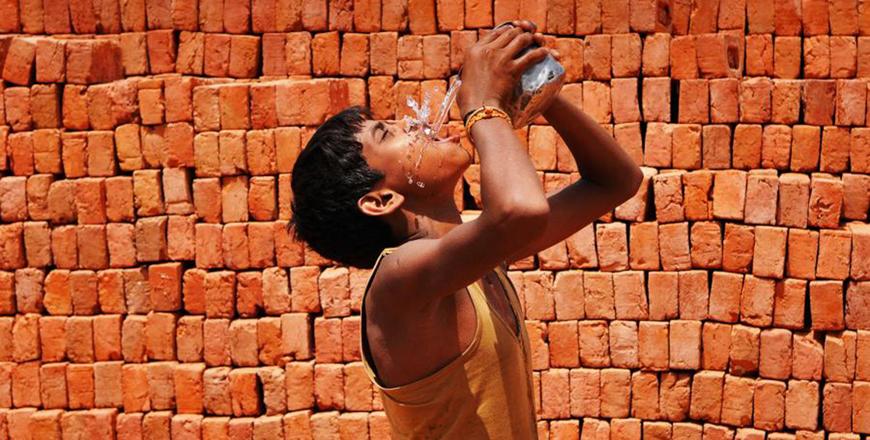- Mix
- Thu-2021-06-03 | 01:49 pm

Nayrouz News Agency :
More than a third of summer heat-related fatalities are due to climate change, researchers said on Monday, warning of even higher death tolls as global temperatures climb.
Previous research on how climate change affects human health has mostly projected future risks from heatwaves, droughts, wild fires and other extreme events made worse by global warming.
How much worse depends on how quickly humanity curbs carbon emissions, which hit record levels in 2019 but dipped sharply during the pandemic.
But a new study by an international team of 70 experts is one of the first — and the largest — to look at health consequences that have already happened, the authors said.
The findings, published in Nature Climate Change, were stark: data from 732 locations in 43 countries spread across every inhabited continent revealed that, on average, 37 per cent of all heat-related deaths can be attributed directly to global warming.
"Climate change is not something in the distant future,” senior author Antonio Gasparrini, a professor of biostatistics and epidemiology at the London School of Hygiene and Tropical Medicine, told AFP.
"We can already measure negative impacts on health, in addition to the known environmental and ecological effects.”
The authors said their methods — if extended worldwide — would add up to more than 100,000 heat-related deaths per year laid squarely at the feet of manmade climate change.
Differences across countries
That number could be an underestimate because two of the regions for which data was largely missing — south Asia and central Africa — are known to be especially vulnerable to extreme heat deaths.
The 100,000 figure is consistent with a recent analysis from the Institute for Health Metrics and Evaluations (IHME), published in The Lancet.
Th IHME calculated just over 300,000 heat-related deaths worldwide from all causes in 2019. If just over a third of those deaths are due to climate change, as Gasparrini’s team reported, the global total would indeed be more than 100,000.
India accounted for more than a third of the total in the IHME tally, and four of the five worst-hit countries were in south Asia and central Africa.
The share of heat-related deaths attributable to global warming in the new study varied widely from country to country.
In the United States, Australia, France, Britain and Spain, for example, that percentage was roughly in line with the average across all countries, between 35 and 39 per cent.
For Mexico, South Africa, Thailand, Vietnam and Chile, the figure rose above 40 per cent.
And for half-a-dozen countries — Brazil, Peru, Colombia, the Philippines, Kuwait and Guatemala — the percentage of heat-related mortality caused by climate change was 60 per cent or more.
A complex methodology combining health data and temperature records from 1991 to 2018, coupled with climate modelling, allowed researchers to contrast the actual number of heat-related deaths with how many fewer deaths there would have been without manmade warming.
Adapt or die
The researchers found that it is not the increase in average summer temperature — up 1.5ºC since 1991 in the locations examined — that boosted death rates, but heatwaves: how long they last, nightime temperatures, and humidity levels.
Also crucial is the ability of the population to adapt.
If 95 per cent of the population has air conditioning, mortality will be lower. But if they don’t, or if farmers must work outside in 45ºC heat to feed their families, the impacts can be catastrophic.
Even wealthy nations remain vulnerable: in 2003, a relentless heatwave in western Europe claimed 70,000 lives.
Deadly heatwaves that might have occurred once a century before climate change kicked in could, by mid-century, happen far more frequently, scientists warn.
The burgeoning field of attribution climate science measures by how much, for example, a typhoon’s intensity, a drought’s duration, or a storm surge’s destruction has been amplified by global warming.
But little research has tried to do the same for human health, notes Dan Mitchell, a researcher at the Cabot Institute for the Environment at the University of Bristol.
"This shift in thinking is essential ... so that global leaders can understand the risks,” he said in a comment in Nature Climate Change.
-
 Will Trump end up like Kennedy?2026-02-03
Will Trump end up like Kennedy?2026-02-03








